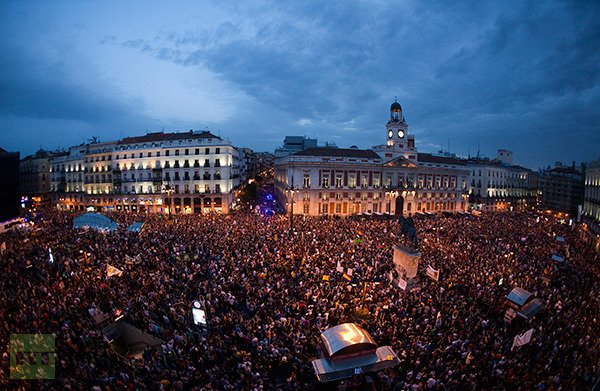
Tens of thousands of people have protested in capital Madrid and in a number of Spanish cities to mark the first anniversary of the “Indignants” movement.
In central Madrid, many protesters occupying Puerta del Sol square ignored a midnight deadline to disperse.
However, by 05:00 a.m. on Sunday police had mainly evicted them.
Indignants movement was formed out of anger at the impact of Spain’s deepest economic crisis in decades. Unemployment hit a record high in April.
The centre-right government has recently announced fresh austerity measures.
The turnout in Madrid was huge and would certainly have met organizers’ expectations.
Spanish authorities had said they wanted the protesters to disperse by midnight local time but many ignored the time limit.

Police vans eventually moved in and appeared to have cleared protesters from the square. The atmosphere in other parts of the city centre was reported to be tense on Sunday morning but there were no reports of violence.
“Today’s goal is to recover the public spaces,” protester Sofia Ruiz earlier told Reuters.
“It is also a way to celebrate that we have been existing for one year and that we are going to be there until the system changes or we are listened to and they take into account our claims,” she added.
Last year the Indignants established a protest camp in Puerta del Sol, but the authorities had vowed they would prevent any protesters from staying overnight in the square.
There were some 2,000 riot police on duty.
At least 45,000 people also took to the streets in Barcelona, police said, although organizers put the attendance in the hundreds of thousands.
One protester there, Jose Helmandez, said he was a genetics and molecular biology doctor but had been unable to find a job in his field.
“A lot of people are leaving the country to find work, even if they end up not doing something they are qualified to do,” he said.
“I was living in France but returned to Spain almost two years ago, and all I can find are short-term jobs.”
Some have criticized the movement for having little impact on Spanish politics over the past year.
The government of conservative Prime Minister Mariano Rajoy, elected last November, has introduced budget cuts and tax rises.
Mariano Rajoy has also announced deregulation of the labor market, angering Spanish unions.
“This is a long-distance race, no-one can change an entire political system in one day or one year, it takes time,” Noelia Moreno, a former spokeswoman for the Indignants movement in Madrid, told AFP news agency.
Similar protests took place in other cities in Spain and across the world as part of a global day of action, some of them staged by the Occupy movement:
• In London, hundreds of protesters gathered outside St Paul’s Cathedral, where a protest camp was removed in February. A number of people were arrested
• Smaller protests, numbering in the hundreds, have taken place in the Portuguese capital Lisbon and in Germany’s financial centre, Frankfurt
• Around 1,000 marchers converged in Tel Aviv to protest about the cost of living, with marches also reported in other Israeli cities
Meanwhile, in the latest attack on symbols of Italy’s austerity policies, a tax office has been firebombed in the city of Livorno. No-one was hurt.
[youtube tykQjGtW4Hk]